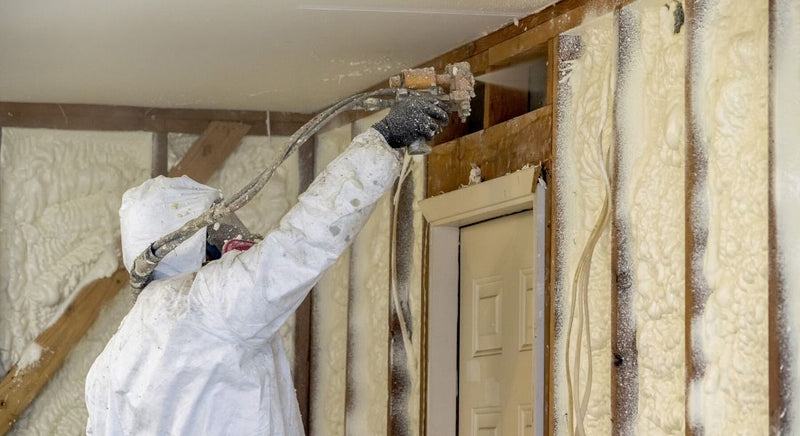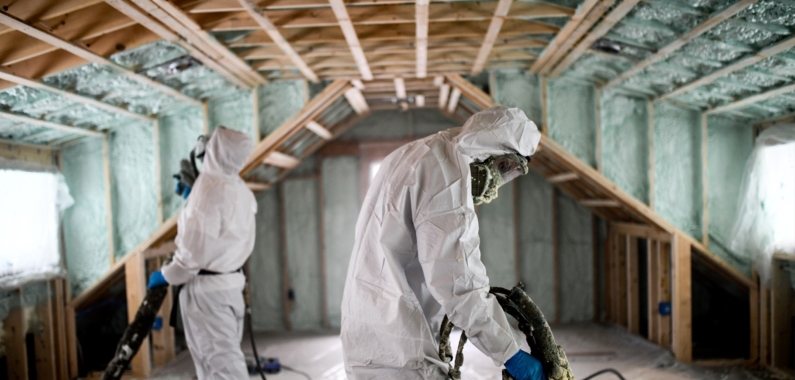How Spray Foam Can Enhance Energy Efficiency in your house
How Spray Foam Can Enhance Energy Efficiency in your house
Blog Article
Spray Foam: The Ultimate Solution for Air Sealing and Insulation
Spray foam insulation has emerged as a leading option for reliable air securing and thermal insulation, providing an unique combination of properties that set it aside from standard techniques. Its capability to increase and fill gaps makes it specifically reliable in stopping air leak, which can significantly influence energy performance. Recognizing the complete scope of its advantages, installment procedures, and contrasts with other insulation kinds is important for making educated choices. As we discover these aspects, the effects for both brand-new buildings and retrofits end up being increasingly substantial. What variables should affect your option?
What Is Spray Foam?
Spray foam is a flexible insulation material that integrates the principles of air sealing and thermal resistance to boost energy effectiveness in structures. Made up mostly of polyurethane or other comparable compounds, spray foam is applied as a fluid that increases upon call with surface areas, producing a solid, constant layer of insulation. This distinct building permits it to fill gaps, fractures, and voids that traditional insulation products may ignore, giving a remarkable air seal.
There are two main kinds of spray foam: open-cell and closed-cell. Open-cell spray foam is lighter and extra versatile, using exceptional noise absorption and a reduced R-value per inch - Spray Foam. In comparison, closed-cell spray foam is denser, offering a higher R-value, moisture resistance, and added structural stability to building elements
The application process normally includes customized tools, guaranteeing a smooth application that abides by numerous substratums, including wood, concrete, and metal. This flexibility makes spray foam suitable for both brand-new buildings and retrofitting existing frameworks. Its capacity to develop an impermeable barrier substantially contributes to lowering energy usage and enhancing interior air high quality, consequently making it a favored option amongst home builders and house owners alike.
Benefits of Spray Foam Insulation
One of the most significant benefits of spray foam insulation is its phenomenal ability to develop a continual air barrier, which successfully reduces energy loss. Unlike typical insulation materials, spray foam broadens to load gaps and cracks, making sure that air leak is considerably lowered. This particular not only boosts energy performance yet also brings about reduce utility bills in time.
Additionally, spray foam insulation provides exceptional thermal resistance, adding to an extra stable interior atmosphere. Its high R-value per inch permits for reliable insulation in confined areas, making it perfect for attic rooms, wall surfaces, and crawl areas. The moisture-resistant properties of spray foam aid avoid mold and mildew and mold growth, promoting much healthier living problems.
An additional crucial benefit of spray foam insulation is its sound-dampening high qualities (Spray Foam). It successfully minimizes noise transmission between spaces, producing a quieter and extra comfy home setting. The durability of spray foam additionally stands out, as it does not droop or settle over time, maintaining its performance throughout its life-span
How Spray Foam Works
Recognizing exactly how spray foam insulation works is vital for valuing its effectiveness in air securing and thermal resistance. Spray foam insulation contains two main elements: isocyanate and polyol material. When these components are combined, they undertake a chemical response that triggers the material to expand swiftly, developing a thick foam that fills up tooth cavities, cracks, and gaps.
As the foam expands, it sticks to click for more surface areas, forming a closed seal that substantially reduces air infiltration. This particular makes spray foam insulation very reliable at avoiding drafts and moisture infiltration, which can bring about energy loss and damage in time. In addition, the closed-cell version of spray foam uses remarkable thermal resistance as a result of its inflexible structure, successfully reducing heat transfer.
The one-of-a-kind residential or commercial properties of spray foam allow it to adapt uneven surfaces, making certain detailed protection and a seamless barrier. Therefore, spray foam insulation not just improves power effectiveness however also contributes to boosted interior air top quality by decreasing the buildup of contaminants and irritants. Eventually, recognizing the technicians behind spray foam emphasizes its role as an exceptional choice for insulation and air sealing in both household and industrial applications.
Setup Process Summary

Before setup, the space has to be sufficiently cleaned and prepped, making sure that surfaces are without wetness, dust, and particles. This step is important due to the fact that contaminants can jeopardize attachment and general efficiency. Once the location is prepared, the application entails blending both components of the spray foam, which expands upon get in touch with and fills spaces efficiently.
Trained specialists ought to conduct the installment, using customized tools to ensure uniform insurance coverage and optimum density. Security precautions, consisting of using safety equipment and guaranteeing proper air flow, are imperative during this process. After application, the foam generally treatments quickly, developing a strong barrier that boosts power efficiency.
Contrasting Spray Foam to Conventional Insulation
When evaluating insulation options, spray foam insulation stands out in contrast to conventional products such as fiberglass and cellulose. One of the main benefits of spray foam is its superior air sealing abilities. Unlike fiberglass and cellulose, which can allow air seepage, spray foam increases upon application, filling up spaces and gaps to develop an impermeable seal. This causes enhanced energy performance, as less heated or cooled down air leaves the home, bring about lower energy costs.
Additionally, spray foam supplies a higher R-value per inch than conventional insulation types, offering more efficient thermal resistance in a thinner account. This characteristic is especially valuable in rooms with limited cavity depth. Additionally, spray foam is immune to wetness and mold and mildew growth, which can be a substantial worry about cellulose and fiberglass, specifically in damp atmospheres.
However, spray foam insulation commonly lugs a visit this website higher ahead of time expense than its conventional counterparts. Home owners need to weigh this initial financial investment versus lasting power savings and performance benefits. Eventually, while both insulation kinds offer their function, spray foam becomes an advanced option for contemporary insulation demands, specifically in terms of air securing and thermal effectiveness.

Conclusion
In recap, spray foam insulation stands for an extremely effective solution for accomplishing ideal air sealing and thermal resistance. Its unique residential or commercial properties, including dampness resistance and sound dampening, make it suitable for various applications in both brand-new building and constructions and retrofitting tasks (Spray Foam). Although the preliminary expenses might be higher compared to conventional insulation products, the long-term benefits, such as substantial energy savings and boosted interior air top quality, validate the investment and emphasize its worth in modern-day structure techniques.
Spray foam insulation has emerged as a leading service for efficient air sealing and thermal insulation, providing a special combination of buildings that establish it apart from conventional approaches.Spray foam is a functional insulation product that integrates the concepts of air securing and thermal resistance to improve power performance in buildings.When examining insulation alternatives, spray foam insulation stands out in comparison to conventional products such as fiberglass and cellulose. Eventually, while both insulation kinds serve their purpose, spray foam emerges as a much more advanced service for contemporary insulation needs, particularly in terms of air sealing and thermal effectiveness.
In recap, spray foam insulation represents a very efficient option for accomplishing ideal air sealing and thermal resistance.
Report this page